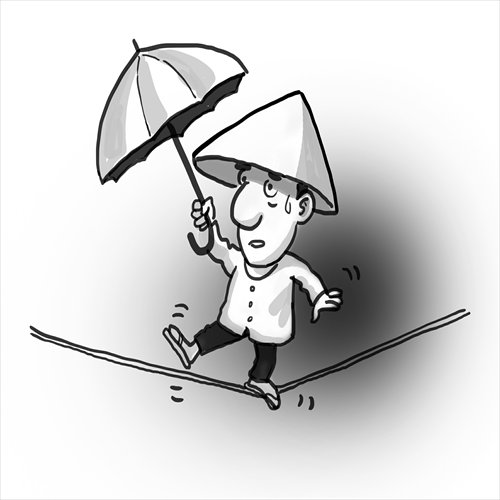Hanoi playing risky game between US, China

Illustration: Liu Rui/GT
In mid-August, Martin Dempsey became the first US chairman of the Joint Chiefs of Staff to visit Vietnam since 1971. This four-day visit by the US top military officer bore symbolic significance for the growing defense and security cooperation between Hanoi and Washington.
Many analysts deem this visit as a major step forward for both countries to reinforce their military ties.
After Dempsey's visit, another diplomatic move by Vietnam captured headlines. Le Hong Anh, a special envoy of the general secretary of the Communist Party of Vietnam Central Committee, and also a politburo member, paid a visit to Beijing on Friday, an ice-breaking one since the oil rig crisis in May.
It is interesting to compare the two trips. Dempsey's visit has sent a signal that Vietnam and the US are looking forward to closer cooperation on security, including the possibility of Washington easing its sanctions on arms exports to Vietnam. This might boost Hanoi's confidence in tackling Beijing.
But Le's visit has sent a different signal that Hanoi still wants to value a stable and positively interactive relationship with Beijing, despite the fact that both sides have been at daggers drawn in the past few months.
The two signals may contradict each other. A stronger Vietnam-US military relationship will raise Beijing's suspicion about Hanoi's honesty in mending its ways.
Meanwhile, the special envoy's visit to China will also make Washington realize that Hanoi will not pick sides and seek an alliance with the US, even if Washington tries to draw Hanoi over to its side by offering military assistance.
This kind of "middle way" has disappointed both China and the US to some extent. It seems that Vietnam is trying to employ this self-contradictory approach to align its own national interests.
On the one hand, Hanoi needs Washington's backup, but cannot be truly dependent on Washington.
The mayhem in Iraq, Afghanistan and Ukraine and Washington's feeble countermeasures have shown the high risks that any country has to take if it places all its bets on the US in the face of crisis.
Washington is taking a much prudent attitude toward its security promises to other nations.
Considering the simmering South China Sea disputes, there are very few benefits Washington can earn from giving Vietnam security promises. On the contrary, it has to bear great risks and costs if it has to fulfill them.
What's more, a historical grudge still haunts Vietnam and the US, and it won't be easy to turn over a new leaf.
As a result, even if the military and national security cooperation between Vietnam and the US can improve, the momentum will still be checked.
On the other hand, Vietnam knows that it cannot challenge China in the South China Sea at the cost of leading the bilateral relationship into a deadlock.
Hanoi can choose its friends but not its neighbors. Small and medium-sized nations won't engage in full-scale confrontations with their neighboring major powers, unless they have no alternative.
Hanoi resorting to provocations when dealing with China is an unwise strategy. Vietnam should employ more flexible approaches when its relationship with China turns sour, because elasticity is badly needed for both sides to achieve compromise at certain times.
The ideal scenario for Hanoi is that it can have wider access to Washington's support in terms of politics, national security and diplomacy amid escalating tensions with China. And meanwhile, it can be more capable of taking advantage of this support, though much limited, to make a fuss in the South China Sea.
This ideal scenario can only be acquired on the condition that Hanoi is able to maintain the stability and balance of a triangular relationship with Washington and Beijing.
However, it is not just Vietnam that makes the call. Vietnam is taking risks by gaining advantage from both the US and China. China, has been exercising restraint. But the situation may go out of control if Vietnam keeps being provocative.
Having things both ways between China and the US is a dangerous game for Vietnam. Hanoi should stop swaying and hold a fixed position on the South China Sea issue. Hanoi needs greater strategic wisdom, rather than just some contingent, opportunist moves.
The author is a professor at the Guangdong Research Institute for International Strategies. opinion@globaltimes.com.cn